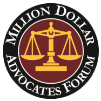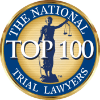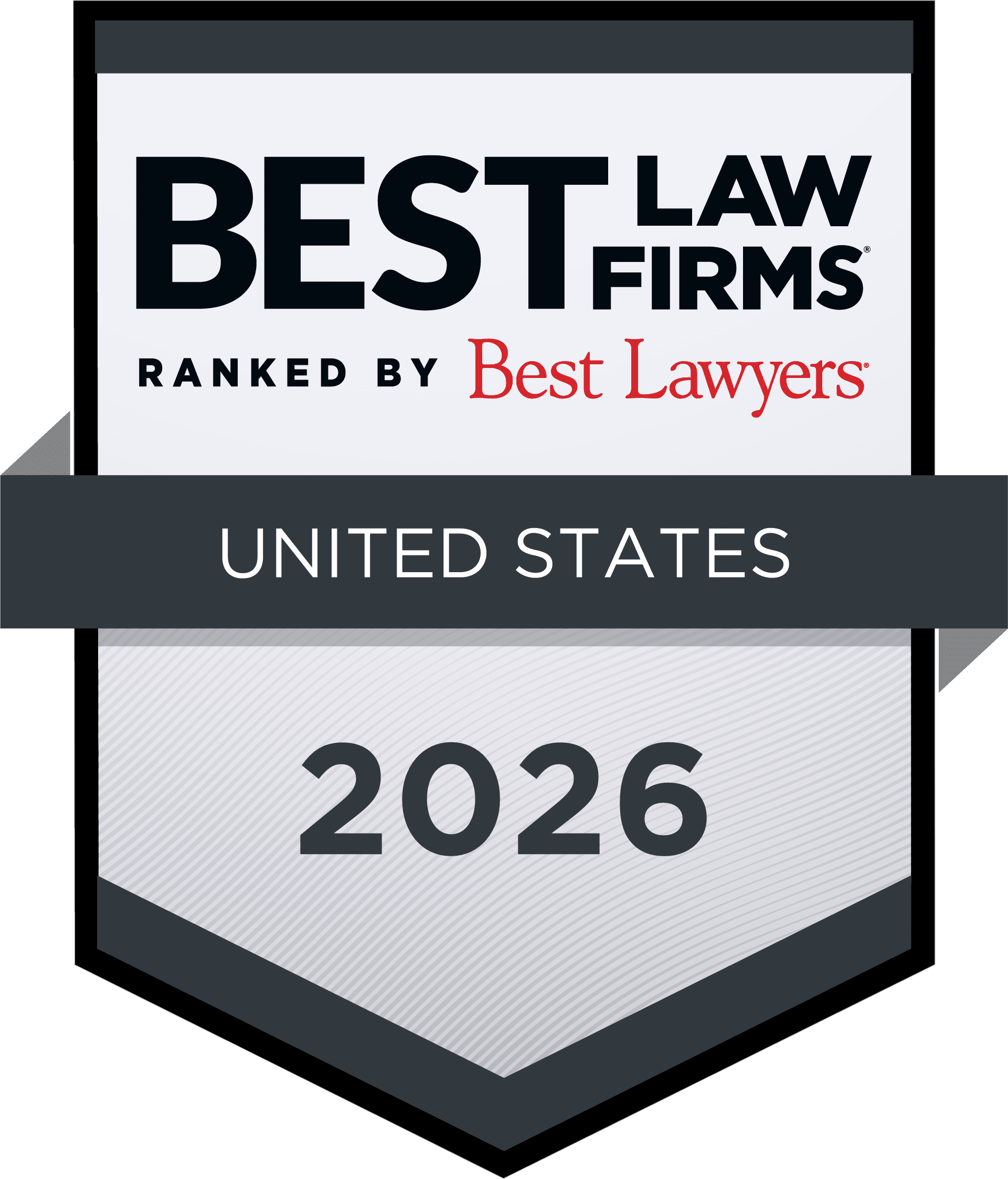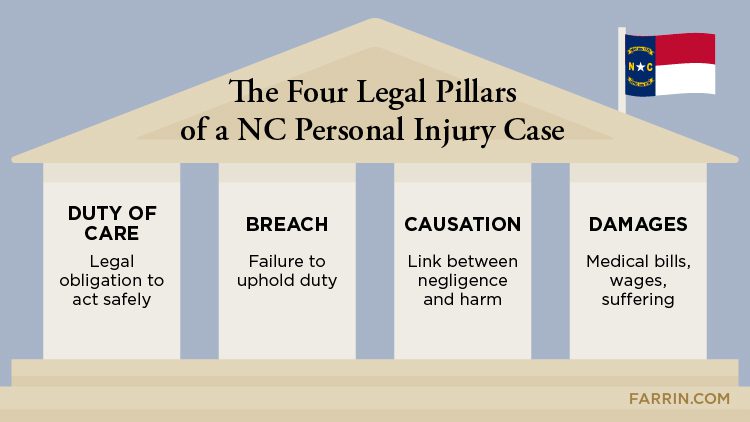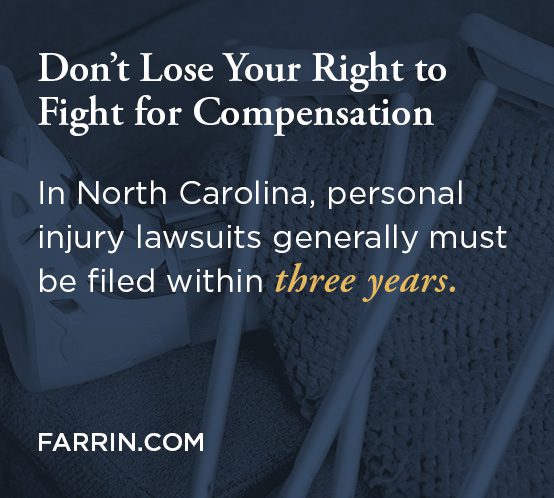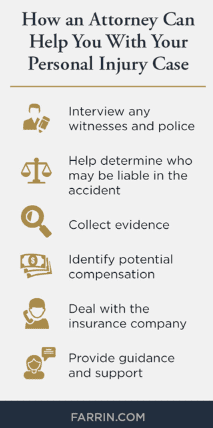The insurance company already called, haven’t they? We know their tactics.
If an insurance company pressures you to settle for less, our experienced North Carolina injury lawyers can fight back for you. 14 offices statewide. No upfront costs.

This page refers to Personal Injury in North Carolina.
Since laws differ between states, if you are located in South Carolina, please click here.
North Carolina Personal Injury Lawyer
If the insurance company has already called, they’re likely pushing for a quick settlement while you may still be in pain, bills are piling up, and you’re wondering if you’ll ever feel normal again. Whether your injury happened on I-40 near Raleigh, in a Charlotte dog park, or at a Wilmington shopping center, you want someone who understands what you’re going through and knows how to fight back.
Dealing with insurance companies and navigating the legal system frustrates many people when they need to focus on recovery. If you’ve been hurt, you deserve an advocate who will fight tirelessly for your rights. This is where a North Carolina personal injury lawyer from the Law Offices of James Scott Farrin can help. Contact us today for a free case evaluation and to learn more about your legal rights.
Key Takeaways – North Carolina Personal Injury Lawyer
- North Carolina personal injury claims typically require proving duty of care, breach of duty, and direct causation of injuries and damages.
- The state generally follows a three-year statute of limitations for most personal injury lawsuits from the date of accident or injury.
- Potential compensation may include economic damages like medical expenses and lost wages, plus non-economic damages for pain and suffering.
- At the Law Offices of James Scott Farrin, we work on a contingency fee arrangement, meaning you pay no fees unless we recover for you. Guaranteed.²
- Various parties may be held liable including drivers, property owners, or government entities depending on accident circumstances.
Why Choose the Law Offices of James Scott Farrin for Your Personal Injury Case
Choosing the right legal representation for you after an injury can make all the difference. At the Law Offices of James Scott Farrin, our mission is to provide excellent legal representation for injured individuals, putting your needs first. We have built a reputation for great results by relentlessly pursuing justice and significant compensation for our clients across North Carolina and beyond.¹
With offices in these North Carolina cities, our legal team is nearby and ready to help:
- Asheville
- Charlotte
- Durham
- Fayetteville
- Goldsboro
- Greensboro
- Greenville
- Henderson
- New Bern
- Raleigh
- Rocky Mount
- Wilmington
- Wilson
- Winston-Salem
- Or we can come to you anywhere across the state
Our firm brings substantial resources and experience to your corner. We have a dedicated team of 60+ attorneys and over 200 staff members, all committed to helping you.
- We have recovered over $2 billion total for over 78,000 clients since 1997. And counting.¹
- We recovered over $230 million total for over 4,500 clients in 2025 alone.¹
- These numbers don’t include the $1.25 billion we led a team of firms to recover for 15,700 claimants in a historic class action case against the U.S. government for discrimination.*
But numbers only tell part of the story. How we treat you tells the other part. At our firm, you’ll work directly with experienced lawyers who know your name, your story, and what you need to move forward. Our You-First Policy means:
- We advance all case costs so you pay nothing upfront.²
- We explain everything in plain English, not legal jargon.
- We fight for what we believe you deserve, not just what may be easy to get.
Many of our attorneys are recognized professionals, and several are North Carolina State Bar Board Certified as Specialists in their practice fields.
Our streamlined processes and proprietary software are designed to handle cases efficiently. You will receive consistent updates and clear communication every step of the way. When you work with us, you are not just a case number. You are a valued client whose well-being is our priority.
What Is a Personal Injury Claim in North Carolina?
A personal injury claim in North Carolina arises when an individual suffers harm, whether physical, emotional, or financial, due to another party’s negligence or wrongful act. The goal of a personal injury claim is to seek compensation for those damages.
To succeed, it must typically be demonstrated that:
- The at-fault party had a duty of care.
- They breached that duty through their actions or inaction.
- This breach directly caused your injuries.
- This breach led to you suffering damages.
These legal elements must be proven in an injury case before the responsible party is obligated to compensate the injured person. During a free case evaluation, we can give you clarity on how strong your case might be.
Types of Personal Injury Cases We Handle
The Law Offices of James Scott Farrin handles a wide array of personal injury cases, including:
- Auto Accidents (Car, Truck, Motorcycle, Hurt by DWI, Pedestrian, Bicycle)
- Personal Injury (general, like a slip & fall or burn injury)
- Civil Rights
- Class Action Lawsuits
- Complex Litigation
- Defective Products & Drugs (Product Liability)
- Medical Malpractice
- Workers’ Compensation
- And many more
If you were injured in any of these scenarios, reach out to learn more about your legal rights.
Common Injuries in Personal Injury Cases
The types of injuries resulting from accidents vary greatly in severity and long-term impact. We have experience helping clients who have suffered from:
- Traumatic Brain Injuries (TBIs)
- Spinal Cord Injuries
- Broken Bones and Fractures
- Burn Injuries
- Dog Bites
- Catastrophic Injuries
- Wrongful Death
- Injuries to Passengers and Children
- Sexual Abuse and Assault
If your injuries are not listed above, we can still help with your injury case. Share your story with us, and we can discuss your options.
Who May Be Held Liable in a North Carolina Personal Injury Claim?
In a North Carolina personal injury claim, various parties might be legally responsible, depending on the circumstances of your accident. Liability is typically assigned to any individual, business, or entity whose negligence directly caused your injuries. Common liable parties include:
- Drivers: In car, truck, or motorcycle accidents, the at-fault driver is often the primary liable party.
- Property Owners: If an injury occurs on someone’s property due to unsafe conditions (e.g., slip and fall), the property owner might be held responsible.
- Commercial Businesses: Businesses can be liable for negligence by employees, unsafe conditions such as wet floors, or selling defective products.
- Product Manufacturers or Distributors: If your injury resulted from a defective product, the company might be held responsible for negligence in design, manufacturing, or distribution.
- Employers: If an employee acting within the scope of their job harmed you (for example, a delivery driver for a NC-based company), their employer might be liable.
- Government Entities: In some specific cases, a government agency, such as the NCDOT, might be held responsible for injuries resulting from poorly maintained public roads or property, or negligent employees.
- Dog Owners: For dog bites, North Carolina follows the “one-bite rule” where the owner may be liable for injuries caused by their animal if the dog was known to be dangerous.
- Medical Professionals and Facilities: Doctors, nurses, and hospitals can be held liable in medical malpractice cases for injuries from their negligent care.
Identifying all potentially liable parties is crucial for trying to maximize your compensation.
What Damages Are Available in a North Carolina Personal Injury Lawsuit?
The law recognizes that you may have lost more than just money—perhaps you’ve also lost your peace of mind, your ability to enjoy life, and maybe even your sense of security. That’s why North Carolina law allows you to seek compensation for everything that may have been taken from you, including:
Economic Damages: These are quantifiable financial losses, such as:
- Medical expenses (past and future)
- Lost wages (past and future)
- Loss of earning capacity
- Property damage
- Rehabilitation costs
- Home modifications for disability
Non-Economic Damages: These are more subjective and can compensate for non-financial losses, including:
- Pain and suffering
- Emotional distress
- Loss of consortium (loss of companionship from a spouse)
- Disfigurement
- Loss of enjoyment of life
In rare cases involving extreme or malicious conduct, a court might also award punitive damages to punish the at-fault party and deter similar behavior in the future.
What Is the Deadline for Filing a Personal Injury Lawsuit in North Carolina?
In North Carolina, there is a strict time limit, known as the statute of limitations, for filing most personal injury lawsuits. Generally, you have three years from the date of the accident or injury to file a lawsuit in civil court. If you miss this deadline, you might lose your right to pursue compensation for your injuries.
There are some exceptions to this rule, which sometimes shorten or extend the deadline depending on the specific circumstances of the case (e.g., cases involving minors, wrongful death). It is crucial to consult with an attorney as soon as possible after an injury to help make sure that your claim is filed within the appropriate timeframe.
How Much Does It Cost to Hire a Personal Injury Attorney in North Carolina?
At the Law Offices of James Scott Farrin, we understand that you might be facing significant financial strain after an injury. That’s why we work on a contingency fee basis for personal injury cases. This means you do not pay us an hourly rate or any upfront fees for our legal services.²
Our fee is calculated only as a percentage of any recovery we achieve for you. If we don’t recover compensation for you, you generally don’t owe us a fee. Guaranteed.² This arrangement allows you to pursue justice with less financial burden and risk, making quality legal representation accessible.
How a Lawyer at the Law Offices of James Scott Farrin Can Help You
Every day you wait, evidence can disappear. Witnesses may forget details. Video footage might get deleted. And insurance companies can use your delay against you.
Here’s how we protect your rights from day one:
We aim to relieve the stress of the legal process so that you may focus on healing.
Get Legal Help Today – No Obligation
If you, or a loved one, have suffered an injury due to someone else’s negligence, don’t face the complex legal system alone. The Law Offices of James Scott Farrin has a proven track record of fighting for the rights of injured people and helping secure compensation they deserved.¹
We understand the physical, emotional, and financial toll an injury takes, and we are ready to put our extensive resources and experience to work for you. Let us help you fight to hold the at-fault party accountable and seek justice for you. For a free and confidential case evaluation, contact us today. Call us 24/7 at 1-866-900-7078 or contact us online now.
*In re Black Farmers Discrimination Litigation, the Law Offices of James Scott Farrin led a team of firms to recover $1.25 billion from the U.S. government for discrimination against African-American farmers.¹
READ MORE
- Aircraft Injuries
- Amusement Park and Water Park Accidents
- Assistance for Crime Victims
- Basics of NC Personal Injury Law
- Boating Accidents
- Consumer Law
- Cruise Ship Accidents
- Debt Collector Lawwuit
- Dog Bite Injury
- Electrocution Accidents
- How to Choose the Best Personal Injury Attorney for You: 10 Penetrating Questions
- Hurricane Damage Claims
- Injuries to Children
- Medical Malpractice in North Carolina
- Serious Injuries
- Sexual Abuse & Assault
- Train Accidents
- Wage and Hour Claims
- Why Hire a Personal Injury Attorney
- Wrongful Death
AWARDS

